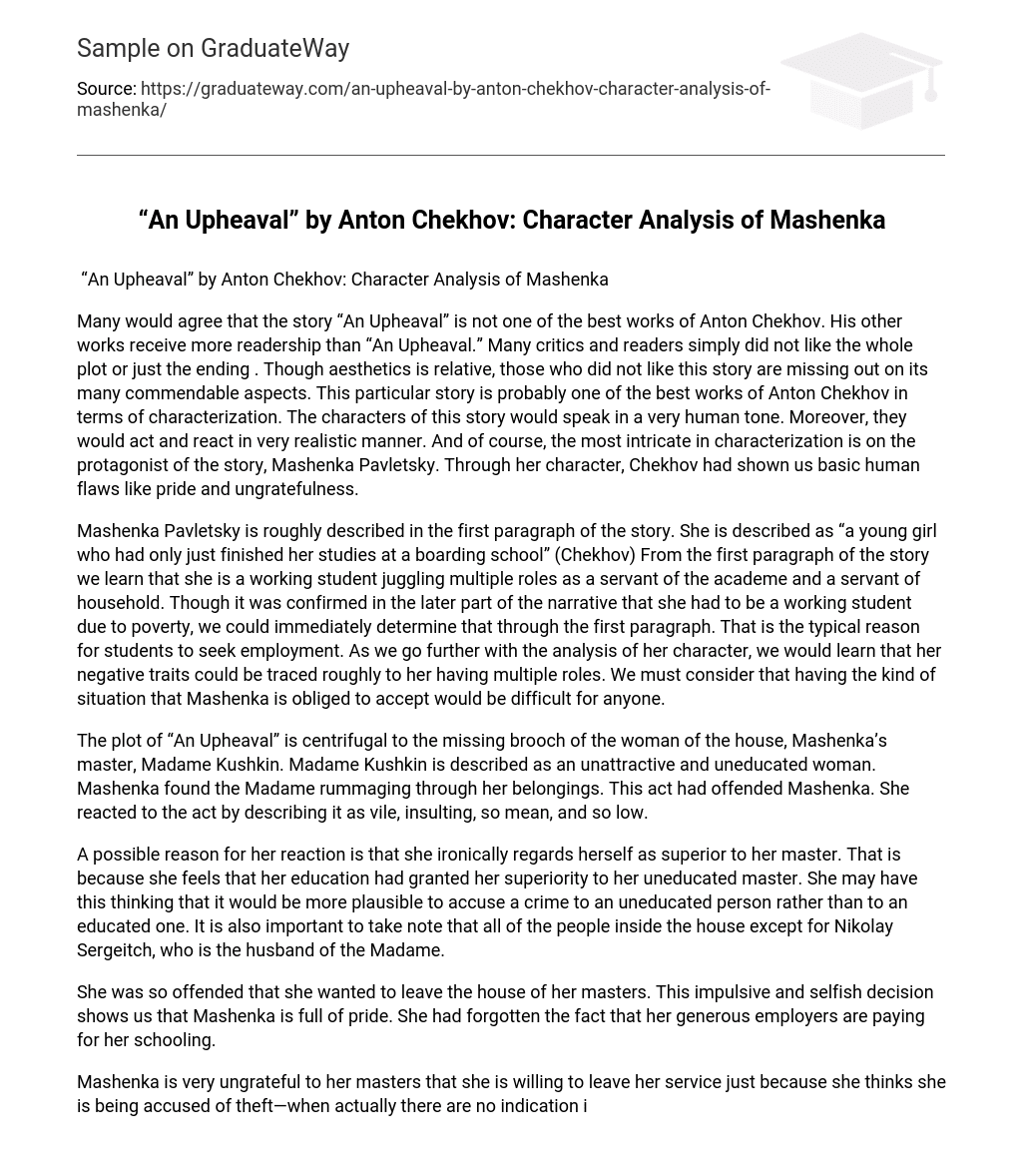Many would agree that the story “An Upheaval” is not one of the best works of Anton Chekhov. His other works receive more readership than “An Upheaval.” Many critics and readers simply did not like the whole plot or just the ending . Though aesthetics is relative, those who did not like this story are missing out on its many commendable aspects. This particular story is probably one of the best works of Anton Chekhov in terms of characterization. The characters of this story would speak in a very human tone. Moreover, they would act and react in very realistic manner. And of course, the most intricate in characterization is on the protagonist of the story, Mashenka Pavletsky. Through her character, Chekhov had shown us basic human flaws like pride and ungratefulness.
Mashenka Pavletsky is roughly described in the first paragraph of the story. She is described as “a young girl who had only just finished her studies at a boarding school” (Chekhov) From the first paragraph of the story we learn that she is a working student juggling multiple roles as a servant of the academe and a servant of household. Though it was confirmed in the later part of the narrative that she had to be a working student due to poverty, we could immediately determine that through the first paragraph. That is the typical reason for students to seek employment. As we go further with the analysis of her character, we would learn that her negative traits could be traced roughly to her having multiple roles. We must consider that having the kind of situation that Mashenka is obliged to accept would be difficult for anyone.
The plot of “An Upheaval” is centrifugal to the missing brooch of the woman of the house, Mashenka’s master, Madame Kushkin. Madame Kushkin is described as an unattractive and uneducated woman. Mashenka found the Madame rummaging through her belongings. This act had offended Mashenka. She reacted to the act by describing it as vile, insulting, so mean, and so low.
A possible reason for her reaction is that she ironically regards herself as superior to her master. That is because she feels that her education had granted her superiority to her uneducated master. She may have this thinking that it would be more plausible to accuse a crime to an uneducated person rather than to an educated one. It is also important to take note that all of the people inside the house except for Nikolay Sergeitch, who is the husband of the Madame.
She was so offended that she wanted to leave the house of her masters. This impulsive and selfish decision shows us that Mashenka is full of pride. She had forgotten the fact that her generous employers are paying for her schooling.
Mashenka is very ungrateful to her masters that she is willing to leave her service just because she thinks she is being accused of theft—when actually there are no indication in the narrative that there was a suspect. All of them were searched equally and it just so happens that Madame Kushkin was caught by Mashenka during the search. Madame Kushkin had even apologized to Mashenka when she was caught meddling with Mashenka’s belongings. Nikolay Sergeitch even begged Mashenka no to leave. As opposed to Mashenka, Nikolay Sergeitch had swallowed his own pride and begged even if he is Mashenka’s employer. He had even admitted that he stole the brooch, a confession that he would not tell to anybody.
Nikolay Sergeitch and Madame Kushkin had worked well as a foil for Mashenka, who is full of pride and ungratefulness. In many ways, she is the antagonist to herself.
Work Cited
Chekov, Anton. “An Upheaval”





